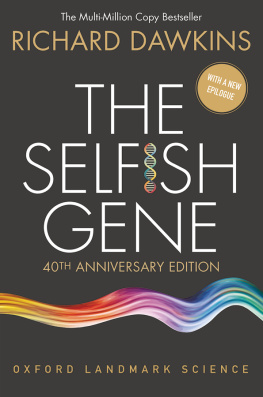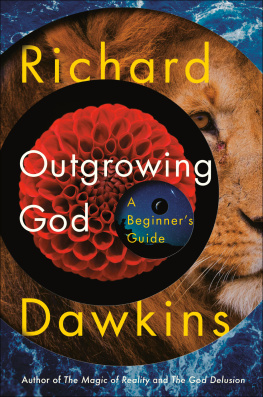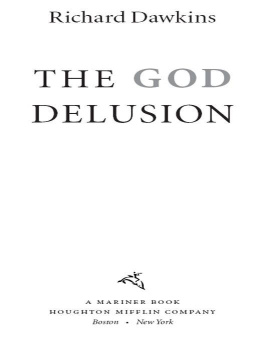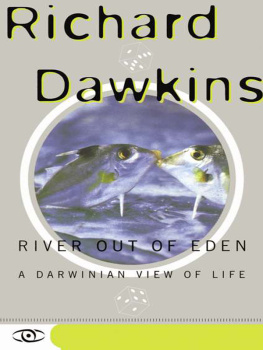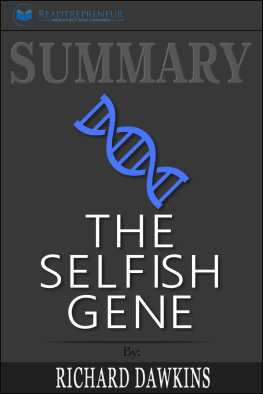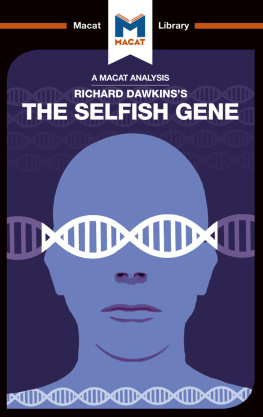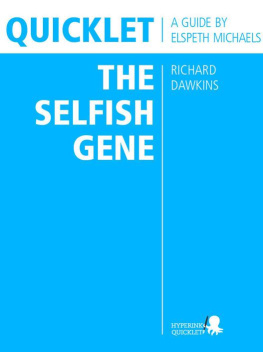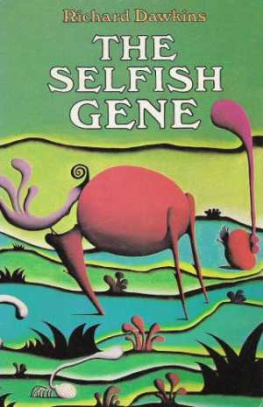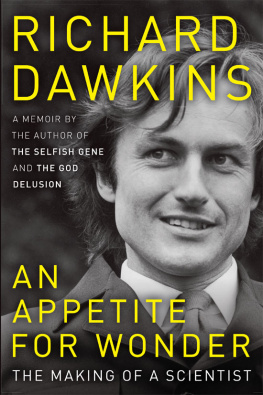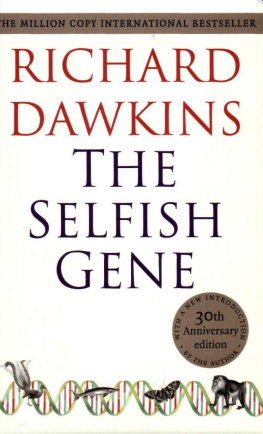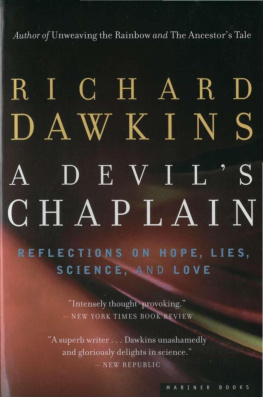Dawkins - The Selfish Gene
Here you can read online Dawkins - The Selfish Gene full text of the book (entire story) in english for free. Download pdf and epub, get meaning, cover and reviews about this ebook. City: Oxford, year: 2016, publisher: Oxford University Press, Incorporated, genre: Art. Description of the work, (preface) as well as reviews are available. Best literature library LitArk.com created for fans of good reading and offers a wide selection of genres:
Romance novel
Science fiction
Adventure
Detective
Science
History
Home and family
Prose
Art
Politics
Computer
Non-fiction
Religion
Business
Children
Humor
Choose a favorite category and find really read worthwhile books. Enjoy immersion in the world of imagination, feel the emotions of the characters or learn something new for yourself, make an fascinating discovery.
- Book:The Selfish Gene
- Author:
- Publisher:Oxford University Press, Incorporated
- Genre:
- Year:2016
- City:Oxford
- Rating:5 / 5
- Favourites:Add to favourites
- Your mark:
- 100
- 1
- 2
- 3
- 4
- 5
The Selfish Gene: summary, description and annotation
We offer to read an annotation, description, summary or preface (depends on what the author of the book "The Selfish Gene" wrote himself). If you haven't found the necessary information about the book — write in the comments, we will try to find it.
The Selfish Gene — read online for free the complete book (whole text) full work
Below is the text of the book, divided by pages. System saving the place of the last page read, allows you to conveniently read the book "The Selfish Gene" online for free, without having to search again every time where you left off. Put a bookmark, and you can go to the page where you finished reading at any time.
Font size:
Interval:
Bookmark:

Richard Dawkins was Charles Simonyi Professor for the Public Understanding of Science at Oxford University from 1995 to 2008. Born in Nairobi of British parents, he was educated at Oxford and did his doctorate under the Nobel Prize-winning ethologist Niko Tinbergen. From 1967 to 1969 he was an Assistant Professor at the University of California at Berkeley, returning as University Lecturer and later Reader in Zoology at New College, Oxford, before becoming the first holder of the Simonyi Chair. He is an Emeritus Fellow of New College.
The Selfish Gene (1976; second edition 1989) catapulted Richard Dawkins to fame, and remains his most famous and widely read work. It was followed by a string of bestselling books: The Extended Phenotype (1982), The Blind Watchmaker (1986), River Out of Eden (1995), Climbing Mount Improbable (1996), Unweaving the Rainbow (1998), A Devils Chaplain (2003), The Ancestors Tale (2004), The God Delusion (2006), and The Greatest Show on Earth (2009). He has also published a science book for children, The Magic of Reality (2011), and two volumes of memoirs, An Appetite for Wonder (2013) and Brief Candle in the Dark (2015). Dawkins is a Fellow of both the Royal Society and the Royal Society of Literature. He is the recipient of numerous honours and awards, including the 1987 Royal Society of Literature Award, the Los Angeles Times Literary Prize of the same year, the 1990 Michael Faraday Award of the Royal Society, the 1994 Nakayama Prize, the 1997 International Cosmos Prize for Achievement in Human Science, the Kistler Prize in 2001, and the Shakespeare Prize in 2005, the 2006 Lewis Thomas Prize for Writing About Science, and the Nierenberg Prize for Science in the Public Interest in 2009.

Great Clarendon Street, Oxford, ox 2 6 dp , United Kingdom
Oxford University Press is a department of the University of Oxford. It furthers the Universitys objective of excellence in research, scholarship, and education by publishing worldwide. Oxford is a registered trade mark of Oxford University Press in the UK and in certain other countries
Richard Dawkins 1989
The moral rights of the author have been asserted
First published 1976
Second edition 1989
30th anniversary edition 2006
40th anniversary edition, as Oxford Landmark Science 2016
Impression: 3
All rights reserved. No part of this publication may be reproduced, stored in a retrieval system, or transmitted, in any form or by any means, without the prior permission in writing of Oxford University Press, or as expressly permitted by law, by licence or under terms agreed with the appropriate reprographics rights organization. Enquiries concerning reproduction outside the scope of the above should be sent to the Rights Department, Oxford University Press, at the address above
You must not circulate this work in any other form and you must impose this same condition on any acquirer
Published in the United States of America by Oxford University Press 198 Madison Avenue, New York, NY 10016, United States of America
British Library Cataloguing in Publication Data
Data available
Library of Congress Control Number: 2016933210
ISBN 9780198788607
ebook ISBN 9780191093074
Printed in Great Britain by Clays Ltd., St Ives plc
It is sobering to realize that I have lived nearly half my life with The Selfish Genefor better, for worse. Over the years, as each of my seven subsequent books has appeared, publishers have sent me on tour to promote it. Audiences respond to the new book, whichever one it is, with gratifying enthusiasm, applaud politely and ask intelligent questions. Then they line up to buy, and have me signThe Selfish Gene. That is a bit of an exaggeration. Some of them do buy the new book and, for the rest, my wife consoles me by arguing that people who newly discover an author will naturally tend to go back to his first book: having read The Selfish Gene, surely theyll work their way through to the latest and (to its fond parent) favourite baby?
I would mind more if I could claim that The Selfish Gene had become severely outmoded and superseded. Unfortunately (from one point of view) I cannot. Details have changed and factual examples burgeoned mightily. But, with an exception that I shall discuss in a moment, there is little in the book that I would rush to take back now, or apologize for. Arthur Cain, late Professor of Zoology at Liverpool and one of my inspiring tutors at Oxford in the sixties, described The Selfish Gene in 1976 as a young mans book. He was deliberately quoting a commentator on A.J. Ayers Language Truth and Logic. I was flattered by the comparison, although I knew that Ayer had recanted much of his first book and I could hardly miss Cains pointed implication that I should, in the fullness of time, do the same.
Let me begin with some second thoughts about the title. In 1975, through the mediation of my friend Desmond Morris I showed the partially completed book to Tom Maschler, doyen of London publishers, and we discussed it in his room at Jonathan Cape. He liked the book but not the title. Selfish, he said, was a down word. Why not call it The Immortal Gene? Immortal was an up word, the immortality of genetic information was a central theme of the book, and immortal gene had almost the same intriguing ring as selfish gene (neither of us, I think, noticed the resonance with Oscar Wildes The Selfish Giant). I now think Maschler may have been right. Many critics, especially vociferous ones learned in philosophy as I have discovered, prefer to read a book by title only. No doubt this works well enough for The Tale of Benjamin Bunny or The Decline and Fall of the Roman Empire, but I can readily see that The Selfish Gene on its own, without the large footnote of the book itself, might give an inadequate impression of its contents. Nowadays, an American publisher would in any case have insisted on a subtitle.
The best way to explain the title is by locating the emphasis. Emphasize selfish and you will think the book is about selfishness, whereas, if anything, it devotes more attention to altruism. The correct word of the title to stress is gene and let me explain why. A central debate within Darwinism concerns the unit that is actually selected: what kind of entity is it that survives, or does not survive, as a consequence of natural selection. That unit will become, more or less by definition, selfish. Altruism might well be favoured at other levels. Does natural selection choose between species? If so, we might expect individual organisms to behave altruistically for the good of the species. They might limit their birth rates to avoid overpopulation, or restrain their hunting behaviour to conserve the species future stocks of prey. It was such widely disseminated misunderstandings of Darwinism that originally provoked me to write the book.
Or does natural selection, as I urge instead here, choose between genes? In this case, we should not be surprised to find individual organisms behaving altruistically for the good of the genes, for example by feeding and protecting kin who are likely to share copies of the same genes. Such kin altruism is only one way in which gene selfishness can translate itself into individual altruism. This book explains how it works, together with reciprocation, Darwinian theorys other main generator of altruism. If I were ever to rewrite the book, as a late convert to the Zahavi/Grafen handicap principle (see pages 40612) I should also give some space to Amotz Zahavis idea that altruistic donation might be a Potlatch style of dominance signal: see how superior to you I am, I can afford to make a donation to you!
Font size:
Interval:
Bookmark:
Similar books «The Selfish Gene»
Look at similar books to The Selfish Gene. We have selected literature similar in name and meaning in the hope of providing readers with more options to find new, interesting, not yet read works.
Discussion, reviews of the book The Selfish Gene and just readers' own opinions. Leave your comments, write what you think about the work, its meaning or the main characters. Specify what exactly you liked and what you didn't like, and why you think so.

